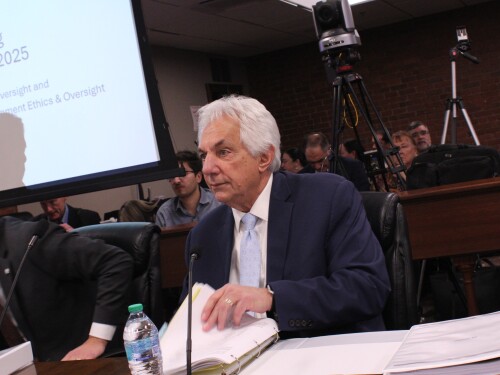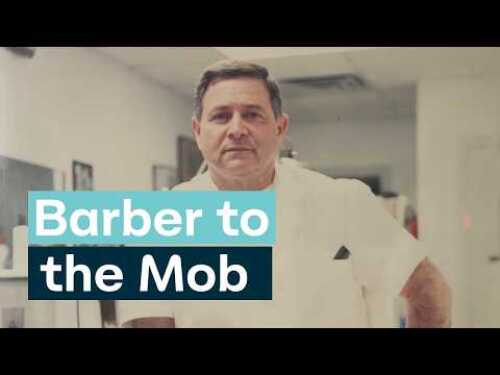The failure of the Washington Bridge raises questions about whether Rhode Island officials should allow outside contractors to ensure the quality of their own work on billions of dollars in construction projects.
That was the main point delivered by Zachary Cunha, formerly the state’s top federal prosecutor, in his closing statement following a five-hour hearing of House and Senate Oversight committees at the Statehouse on Thursday.
It followed lengthy questioning by Cunha of Peter Alviti, director of the Rhode Island Department of Transportation, who again and again blamed the contractors his office hired for the bridge’s sudden closure. Unlike past legislative hearings, Alviti was sworn-in for questioning under oath.
Alviti was unable to name RIDOT’s program manager for bridge inspections and could not say whether any Transportation Department employee has reviewed engineering plans for the Washington Bridge since the westbound span was closed on an emergency basis in December 2023.
After Alviti testified that RIDOT relies on contractors to plan projects, assess their adequacy and actually build the projects, Cunha asked, “Does RIDOT do anything other than sign contracts and pay out money? You have no ability to assess the adequacy of this work?”
Alviti defended RIDOT’s “project management” approach, saying it was encouraged by the Federal Highway Administration and is based on legislation passed by the General Assembly as part of the RhodeWorks’ bridge improvement strategy in 2016.
With the exception of the Washington Bridge calamity, he said RIDOT is delivering bridge improvement projects on time and on budget. More than 350 have been completed in the last nine years and he said the number of deficient bridges in the state is due to fall to 10% next year.
Private sector companies have more expertise than RIDOT in building bridges, and the state hires multiple companies to check each other’s work as a form of accountability, Alviti said.
Alviti rejected Cunha’s suggestions that RIDOT is helpless to ensure that contractors deliver quality work.
“We have a contract that requires them to be absolutely accurate, and in the case of literally $7 billion worth of other projects, they have been,” Alviti said. “In this one case, they were not and that’s what this lawsuit is about.”
Cunha, a former U.S. Attorney for Rhode Island now in private practice, was hired by the legislature to help conduct this hearing. His questions made for a much sharper Oversight hearing than one held last February.
The session marked the first time lawmakers publicly questioned officials since an audit emerged in September on the process of closing the Washington Bridge. The report commissioned by the state suggested that state officials should have been aware of the problems that eventually led to the bridge’s abrupt closure in December 2023.
Alviti said he did not recall being interviewed for the audit.
The state is suing 13 companies that worked on the Washington Bridge, alleging that the companies failed to adequately identify the bridge’s worsening issues. Other efforts to shed light on why the state closed the bridge have been largely stymied, in part because state officials have cited the ongoing lawsuit as a reason not to answer questions.
In response to a question from Cunha on Thursday about inspections of the bridge, Alviti said RIDOT collectively paid companies millions of dollars to assess the bridge’s condition and placed faith in their reports.
“We expect them to deliver a report that is complete and accurate and we don’t second-guess them,” Alviti said. “The responsibility to relay to us any critical findings is entirely the responsibility of those companies.”
Asked whether those reports were adequate, given that the bridge passed inspections before having to be shut down on an emergency basis, Alviti said: “Apparently not.”
A new westbound span is expected to open in November 2028.
This story has been updated with further information from the Statehouse hearing. Ocean State Media’s Jeremy Bernfeld contributed to this story.








